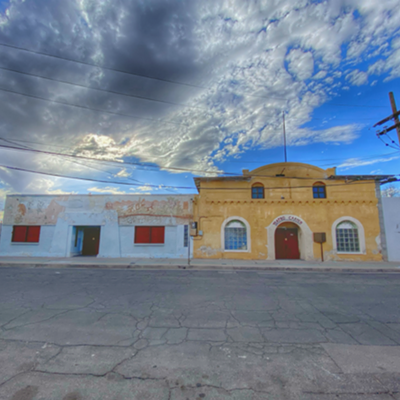A crowd management policy—that would have given the Tucson Police Department authority to crack down on gatherings of 100-plus people—quietly landed on the City Council's agenda last week, but drew enough attention to start a conversation with local activists.
By the time they took their indignation to the streets last Monday afternoon, the proposed ordinance was already removed from the agenda. The council's intention was to take a vote the following day, but a mass of "it's a violation of our First Amendment rights" outcries prevented that from happening.
That day, City Attorney Mike Rankin said in an email to the council that there were "operational and legal" issues he and TPD Chief Roberto Villaseñor had to take care of. The ordinance would make a comeback once the problems had been resolved. Our interview request to Rankin went unanswered.
Paul Gattone, a civil rights attorney and co-owner of Fourth Avenue coffee shop Revolutionary Grounds, heard about it before the weekend and immediately spread the word, organized a protest and sent a letter to the council. The best way to fight something that could potentially tamper people's right to assemble was to do just that—assemble.
The policy, written by TPD legal advisers, would have allowed the police to declare certain demonstrations "crowd management" events; restrict people from going into areas where cops felt there could be public and property damage during these gatherings; and would have made wearing masks or protective gear a misdemeanor offense.
Handing over that much more power to the police "flies in the face of democratic principles," Gattone says.
It disturbed him that the policy even saw the light of day without any public input or a study session from the council. Many others thought it was sneaky to place the ordinance, along another that would have outlawed urban camping in response to the homeless pods downtown (that one was also discarded by the council), at the very bottom of the agenda, meaning the vote would have occurred well into the Saint Patrick's Day evening meeting.
In their defense, council members say they were also caught off guard by the policy.
Gattone isn't buying that. He wonders how a policy that could have had such a significant impact on the constitutional rights of Tucsonans flew under the council members' and their staffs' radar.
"It didn't just appear out of nowhere, and somebody had to intentionally give police control of who is going to use the streets and how we are going to associate and assemble," he says. "Pretending to not know where it came from, it is insulting. Maybe the City Council didn't know, which is a concern ... that someone can put something on the agenda without them knowing."
The council and TPD have said they meant well. The process was rushed because the UA basketball team was doing well in the March Madness tournament, and the city didn't want another show like last year's so-called "basketball riot" on University Boulevard.
"It is a challenge for TPD, obviously it has been, to manage crowds when there is a lot of alcohol and emotions rolling, so I think it would be irresponsible to deny the fact that we have to plan for it and make sure we keep everybody safe," Councilwoman Karin Uhlich says. "But obviously the community, the mayor and council want that to be done without infringing on people's right to assembly."
At the council meeting, Councilman Steve Kozachik, whose ward is at the heart of all-things UA, said the ordinance touched on an important issue, but the city's attorney messed up. The way the rules were drafted was so broad it left the door open to control all public gatherings, including peaceful protests—a constitutional violation.
Councilman Paul Cunningham says it would have been impossible to vote on an item that could have made even the All Souls Procession, which attracts tens of thousands of people, an issue.
"We have enough strategies on crowd control and how we approach March Madness," Cunningham says. "You get a bunch of drunk people together, you are going to run into possible problems, but we should be able to handle that within the ordinances we already have."
Gattone has a question: Do you think the public is dumb? If TPD and the council thought they would sit back and trust the ordinance would only be used for sports crowds, they were wrong, he says.
Local activist Miguel Ortega, who was Uhlich's chief of staff from 2005 to 2010, agrees. He worked at City Hall and he isn't at all surprised that the ordinance made the agenda in such a secretive way.
"Tucson prides itself in being a voice of community, if we claim to be so progressive, so tolerant, celebrating free speech, what are we doing proposing these kinds of ordinances," Ortega says. "That is scary, that bureaucrats feel so empowered to bring such draconian ideas, that they will either think politicians will be asleep at the wheel or that they think the public will be asleep at the wheel."
He argues this is just another example of how transparency in local government continues to diminish, and that the move also highlights an "unhealthy political relationship" between TPD and the council.
"Whether you are a business owner, community member, student, we should all be concerned, no party affiliation, if your voice is stifled, your voice is stifled, whether you are a Republican or a Democrat," he says.
A similar policy targeted to sports crowds could make a comeback, and Uhlich says this time there will be a study session and an opportunity for residents to speak during a call to audience. In the meantime, TPD sent council members an email last week detailing the department's safety preparations as the NCAA tournament plays out.
Gattone and Ortega want Tucson to keep a keen eye on what City Hall is up to.
"We cannot trust government officials to protect our rights, we have to do it ourselves," Gattone says. "The people are going to be upset. They are going to march, to use the streets, which are theirs, to use the sidewalks, which are theirs, to use the public spaces, which are ours, and to protest. Government should not have the ability to limit that, especially this way."







